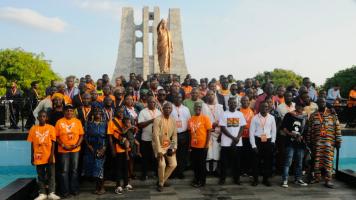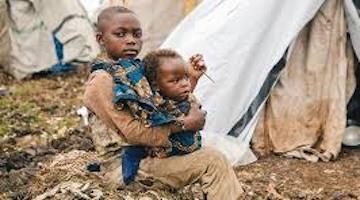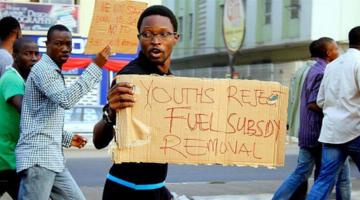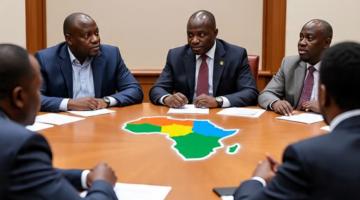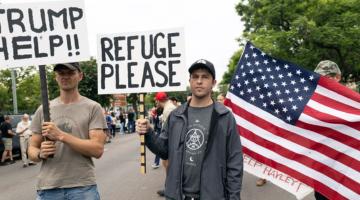A fifth African state, the Republic of Ghana, has been subjected to widespread criticism and legal actions for its participation in illegal deportations from the United States.
Originally published in Fighting Words.
The other four governments, Eswatini, South Sudan, Uganda and Rwanda have already been acknowledged as being collaborators with the administration of President Donald Trump which has deployed thousands of Immigration and Custom Enforcement (ICE) agents across the country to round up people suspected of being inside the country without proper documents.
Mass demonstrations and legal actions are occurring on a daily basis to halt these practices as the Trump administration continues with its stated objectives of removing 11 million people from the U.S. under the guise of “making America great again.” All of the targeted deportees are from states within the Global South, specifically Latin America, Africa and Asia.
These deportations, many of which are occurring absent of due process, represent the racist character of the domestic and foreign policy of the administration. Trump is attempting to remove all legal guarantees under U.S. constitutional law which respect the rights of oppressed peoples and other marginalized groups.
A lawsuit filed by the Asian American Advancing Justice advocacy group has shed light on the secret agreement between the White House and the Ghana government to accept migrants who were born in the West Africa region. This deal was not publicly acknowledged until the details were revealed by the legal action filed on September 12.
According to the legal complaint filed against the U.S. Department of Homeland Security (DHS):
“Defendants know that they may not, consistent with U.S. immigration law, directly deport non-citizens to countries from which they have been granted fear-based protection. As an end-run around this prohibition, Defendants have enlisted the government of Ghana to do their dirty work. Despite the minimal, pass-through involvement of the Ghanaian government, Defendants’ objective is clear: deport individuals who have been granted fear-based relief from being sent to their countries of origin to those countries anyway, in contravention to the rulings of U.S. immigration judges and U.S. immigration law.”
These West African nationals claim they were subjected to brutal treatment at the hands of the U.S. government. They were awakened in the middle of the night at a detention facility in Louisiana while not being told of the destination of their flight.
Some of the detainees were placed in straitjackets during the flight to Ghana. They were denied adequate food, being served only bread and water. Eventually during the flight, the migrants were informed they were headed for Ghana.
After arriving in Ghana, they were dropped off at a military base and housed in deplorable conditions. At present there are conflicting reports as to their whereabouts. The government in Ghana headed by President John Mahama said that the migrants were sent to their home countries despite the unwillingness of several of them to return to the Federal Republic of Nigeria and Gambia. Other reports indicate that some may be still in Ghana or transported to other territories.
Mahama said that since the country allows visa-free travel for those living in the Economic Community of West African States (ECOWAS) region, he would accept them as pass through travelers. Yet, such a statement avoids the legal and political issues involved in these mass deportations of Africans and other people from the Global South by the Trump administration.
In response to the criticism by opposition forces inside of Ghana, the government said that the secret agreement with the Trump White House which allows deportations to proceed in contravention to U.S. law does not mean that Accra is in alliance with the racist policies of the current administration in Washington, D.C. At present there are hundreds of legal challenges to the deployment of ICE agents and federalized National Guard units into U.S. cities such as Los Angeles and the nation’s capital.
Other municipalities have been threatened with troop deployments including Chicago and Memphis as the administration claims that crime rates in these cities require federal intervention. Although cities are saying that crime has decreased in recent years, the underlying causes for urban problems stem from growing impoverishment and the lack of economic, educational, medical and social services.
The U.S. Has a Legacy of Racism and National Oppression
Institutional racism and national oppression have been hallmarks of U.S. society since its inception. Inherited from British colonialism, the U.S. was built on the seizure of lands belonging to the indigenous Native Americans and the importation of enslaved Africans which took place over a period of 250 years. Even after the conclusion of the Civil War (1861-1865), the federal and state governments in the U.S. continued to impose discriminatory policies against African Americans up until the contemporary time period.
The gains made during the Civil Rights and Black Power movements of the post-World War II era resulting in the passage of several legislative initiatives ostensibly aimed at ensuring the human rights of African Americans and other oppressed communities as well as women, are systematically being reversed through executive orders and judicial decisions which are reinstituting legalized segregation and gender oppression.
All of the cities where the National Guard and Marines have been sent are populated by a majority of African American and Latin American peoples. These actions are being carried out despite protests against these deployments by people now residing in these cities.
Ghana Succumbs to Trump Administration Pressure over Tariffs
In the press statement made by President Mahama, he does allude to the diplomatic strongarming imposed by Washington. Nonetheless, other ECOWAS states such as the Federal Republic of Nigeria, Africa’s most populous nation, have rejected the U.S. deportation plans.
Within Ghana itself, the administration of Mahatma has attempted to distance the government from the Trump program. Nonetheless, the secret character of the agreement and the blatant violation of U.S. and international law cannot be ignored.
An Associated Press report on September 15 notes:
“The opposition and activists in Ghana have criticized the decision to accept the third-country deportees. Opposition lawmakers said it raises ‘serious constitutional, sovereignty and foreign policy concerns which cannot be overlooked.’ At a press briefing in the capital of Accra, Ghana’s Foreign Minister Samuel Okudzeto Ablakwa pushed back on criticism that the decision was an endorsement of U.S. President Donald Trump’s immigration policies. Ablakwa said Ghana did not receive any financial compensation from the U.S. over the deportation. Nigeria’s government said it was not briefed about its nationals being sent to Ghana and that previously it had received Nigerians deported directly from the U.S.”
A key element within the lawsuit filed against the U.S. Department of Homeland Security (DHS) is the blatant violation of the Freedom of Information Act (FOIA) which requires transparency for governmental agencies. The third-country deportation scheme with Ghana was never revealed to the U.S. public which compounds the unconstitutional denial of due process for migrants who face possible harm through forced removals.
This very fact strongly diminishes the rationale provided by the Mahama administration. The people of the U.S., Ghana, Nigeria and Gambia were never informed of this secret agreement which contributes to an atmosphere of fear and uncertainty.
Even with the legal challenges in the U.S. federal courts, a judge recently acknowledged the inability to reverse the policies of the Trump administration. The proclamation from a federal judge reinforces the perception of impunity related to the U.S. administration.
In another Associated Press report on this issue, it emphasized that:
“Meanwhile, a U.S. judge said that she was powerless to prevent Ghana from returning deportees in its custody to their home countries, declining to intervene in the case, in a victory for the administration of U.S. President Donald Trump. U.S. District Judge Tanya Chutkan said that although five of the African deportees had been barred from being sent directly from the U.S. to their home countries because of a likelihood of persecution, her ‘hands are tied’ once they are in Ghana.”
These events underline the efforts by the Trump administration to reassert its neo-colonial designs over African Union (AU) member-states. If these five states are willing to acquiesce to the biddings of the U.S. administration, then the potential unity and sovereignty of the continent will be further imperiled.
Since returning to office in January, the Trump White House has announced several “peace agreements” related to conflicts taking place on the African continent and other geo-political regions of the world. None of these initiatives including purported efforts to end the war in Ukraine have borne fruit.
Within the eastern DRC, fighting has continued even though the U.S. Secretary of State along counterparts from Rwanda and Congo signed treaties which supposedly would end the war which has been waged against the M23 rebel grouping. The AU member-states cannot rely on Washington to solve its internal problems. African problems today require African solutions and until this happens the system of neo-colonialism will continue to hamper continental development.
Abayomi Azikiwe is the editor of the Pan-African News Wire. He is a Research Associate of the Centre for Research on Globalization (CRG)

